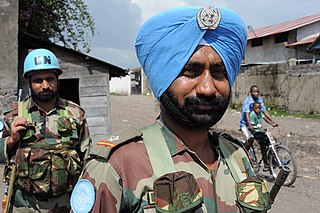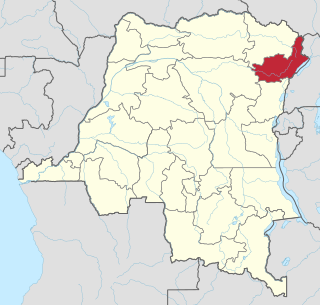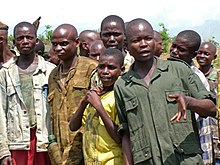
The United Nations Organization Stabilization Mission in the Democratic Republic of the Congo or MONUSCO is a United Nations peacekeeping force in the Democratic Republic of the Congo (DRC) which was established by the United Nations Security Council in resolutions 1279 (1999) and 1291 (2000) to monitor the peace process of the Second Congo War, though much of its focus subsequently turned to the Ituri conflict, the Kivu conflict and the Dongo conflict. The mission was known as the United Nations Mission in the Democratic Republic of Congo or MONUC, an acronym of its French name Mission de l'Organisation des Nations Unies en République démocratique du Congo, until 2010.

The Ituri conflict is an ongoing low intensity asymmetrical conflict between the agriculturalist Lendu and pastoralist Hema ethnic groups in the Ituri region of the north-eastern Democratic Republic of the Congo (DRC). While the two groups had fought since as early as 1972, the name "Ituri conflict" refers to the period of intense violence between 1999 and 2003. Armed conflict continues to the present day.
The Union of Congolese Patriots is a political and militia group in Ituri, northeastern Democratic Republic of the Congo, formed towards the end of the Second Congo War. It was founded by Thomas Lubanga in 2001 and was one of six such groups that sprung up in the mineral-rich Ituri region on the border with Uganda in the Ituri conflict. The UPC supported and was primarily composed of the Hema ethnic group.
Thomas Lubanga Dyilo is a convicted war criminal from the Democratic Republic of the Congo (DRC) and the first person convicted by the International Criminal Court (ICC). He founded and led the Union of Congolese Patriots (UPC) and was a key player in the Ituri conflict (1999–2007). Rebels under his command have been accused of massive human rights violations, including ethnic massacres, murder, torture, rape, mutilation, and forcibly conscripting child soldiers.

The Front for Patriotic Resistance in Ituri is a Bunia-based armed militia and political party primarily active in the south of the Ituri Province of northeastern Democratic Republic of the Congo.

Germain Katanga, also known as Simba, is a former leader of the Patriotic Resistance Force in Ituri (FRPI), an armed group in the Ituri Province of the Democratic Republic of the Congo (DRC). On 17 October 2007, the Congolese authorities surrendered him to the International Criminal Court (ICC) to stand trial on six counts of war crimes and three counts of crimes against humanity. The charges include murder, sexual slavery, rape, destruction of property, pillaging, willful killing, and directing crimes against civilians.

The Kivu conflict is an umbrella term for a series of protracted armed conflicts in the North Kivu and South Kivu provinces in the eastern Democratic Republic of the Congo which have occurred since the end of the Second Congo War. Including neighboring Ituri province, there are more than 120 different armed groups active in the eastern Democratic Republic of Congo. Currently, some of the most active rebel groups include the Allied Democratic Forces, the Cooperative for the Development of the Congo, the March 23 Movement, and many local Mai Mai militias. In addition to rebel groups and the governmental FARDC troops, a number of national and international organizations have intervened militarily in the conflict, including the United Nations force known as MONUSCO, and an East African Community regional force.
Mathieu Ngudjolo Chui is a colonel in the Congolese army and a former senior commander of the National Integrationist Front (FNI) and the Patriotic Resistance Force in Ituri (FRPI).

In areas of the Democratic Republic of the Congo, the human rights record has remained considerably poor, and serious abuses have been committed. Unlawful killings, disappearances, torture, rape, and arbitrary arrest and detention by security forces increased during the year, and the transitional government took few actions to punish harsh people. Harsh and life-threatening conditions in prison and detention facilities; prolonged pretrial detention; lack of an independent and effective judiciary; and arbitrary interference with privacy, family, and home also remained serious problems. Security forces continued to recruit and retain child soldiers and to compel forced labour by adults and children.
Bosco Ntaganda is a convicted war criminal and the former military chief of staff of the National Congress for the Defense of the People (CNDP), an armed militia group operating in the North Kivu province of the Democratic Republic of the Congo (DRC). He is a former member of the Rwandan Patriotic Army and allegedly a former Deputy Chief of the General Staff of the Patriotic Forces for the Liberation of Congo (FPLC), the military wing of the Union of Congolese Patriots.
The assault on Bogoro, which occurred on February 24, 2003, was an attack on the village of Bogoro in the Democratic Republic of the Congo (DRC) by the Nationalist and Integrationist Front (FNI) and the Front for Patriotic Resistance of Ituri (FRPI). The attackers allegedly went on an "indiscriminate killing spree", killing at least 200 civilians, imprisoning survivors in a room filled with corpses, and sexually enslaving women and girls. Two rebel leaders, Germain Katanga and Mathieu Ngudjolo Chui, have been charged by the International Criminal Court with war crimes and crimes against humanity over their alleged role in planning the attack.

The Democratic Republic of the Congo, and the east of the country in particular, has been described as the "Rape Capital of the World", and the prevalence and intensity of all forms of sexual violence has been described as the worst in the world. Human Rights Watch defines sexual violence as "an act of a sexual nature by force, or by threat of force or coercion", and rape as "a form of sexual violence during which the body of a person is invaded, resulting in penetration, however slight, of any part of the body of the victim, with a sexual organ, or of the anal or genital opening of the victim with any object or other part of the body."

United Nations Security Council Resolution 1925, adopted unanimously on May 28, 2010, after reaffirming previous resolutions on the situation in the Democratic Republic of the Congo, the Council extended the mandate of the United Nations Mission in the Democratic Republic of Congo (MONUC) until June 30, 2010, authorised a withdrawal of 2,000 troops and decided that from July 1, 2010, MONUC would be known as the United Nations Organization Stabilization Mission in the Democratic Republic of the Congo (MONUSCO) with a mandate until June 30, 2011.
The Democratic Republic of the Congo (DRC) ratified the 2000 UN TIP Protocol in October 2005.

The International Criminal Court investigation in the Democratic Republic of the Congo or the situation in the Democratic Republic of the Congo is an ongoing investigation by the International Criminal Court (ICC) into crimes committed in the Democratic Republic of the Congo (DRC) during the Second Congo War and its aftermath, including the Ituri and Kivu conflicts. The war started in 1998 and despite a peace agreement between combatants in 2003, conflict continued in the eastern parts of the country for several years. In April 2004 the government of the DRC formally referred the situation in the Congo to the International Criminal Court, and in June 2004, prosecutor Luis Moreno Ocampo, formally opened an investigation. To date, arrest warrants have been issued for:
The Land Forces, also called the Congolese Army, are the land warfare component and the largest branch of the Armed Forces of the Democratic Republic of the Congo (FARDC).
The Popular Front for Justice in the Congo is an armed group operating in the south of Ituri Province in the Democratic Republic of the Congo (DRC), where it has participated in the Ituri conflict. It formed in September 2008 from a splintering of the Front for Patriotic Resistance in Ituri (FRPI) and coalescing of other armed actors, including combatants from the Nationalist and Integrationist Front, who had resisted national disarmament campaigns. The group has expressed opposition to a 2006 attempt to resolve the Ituri conflict, which granted amnesty to former participants in the conflict. In 2011, the group was estimated to have no more than 100 members. Whereas the FRPI was closely linked to the Ngiti ethnolinguistic group, the FPJC incorporated members of more varied ethnic backgrounds.
Cobra Matata is a former leader of the Front for Patriotic Resistance in Ituri (FRPI) and Popular Front for Justice in Congo (FPJC) militias active in the Ituri conflict in the northeastern Democratic Republic of the Congo. He was previously a member of the D.R. Congo armed forces (FARDC), having integrated in 2007 before deserting to reconstitute a rebel group in 2010. In November 2006, Matata had agreed to disarm in exchange for amnesty. In the FARDC, Matata attained the rank of colonel or general. The International Criminal Court classified Matata as Ngiti.

Effacer le tableau was the operational name given to the genocide of the Bambuti pygmies by rebel forces in the Democratic Republic of the Congo (DRC).

CODECO is a loose association of various Lendu militia groups operating within the Democratic Republic of the Congo (DRC). The name is an abbreviation of the group's lesser-known full name, the Cooperative for Development of the Congo, sometimes also styled the Congo Economic Development Cooperative.












